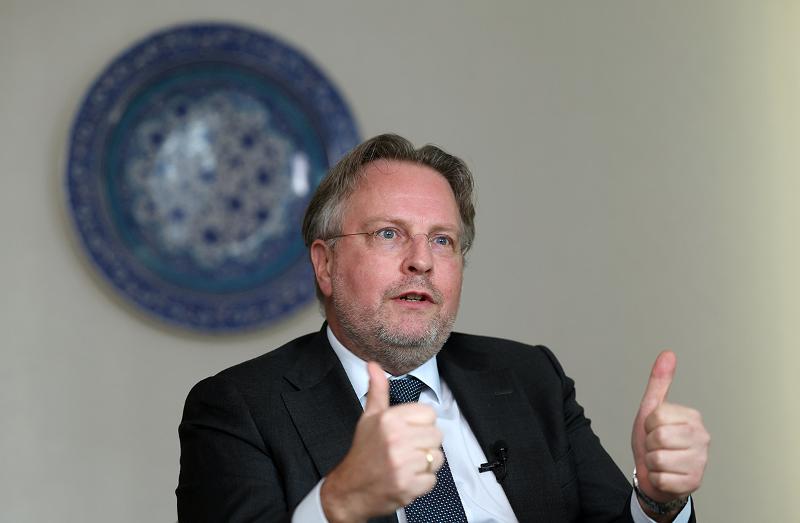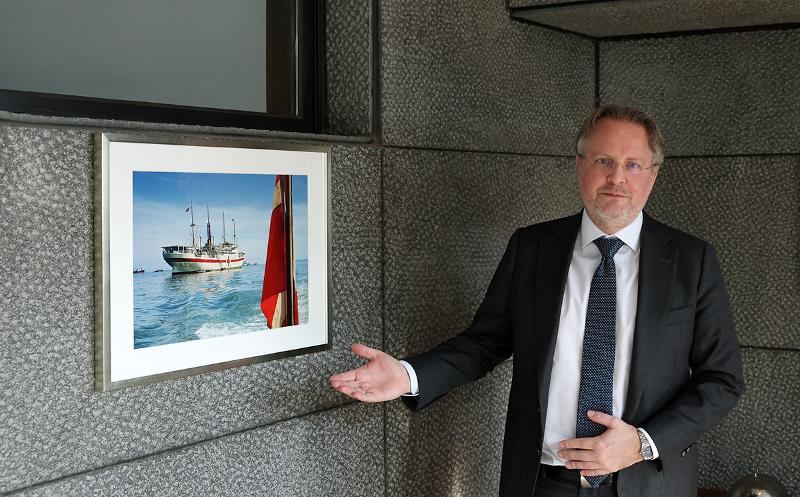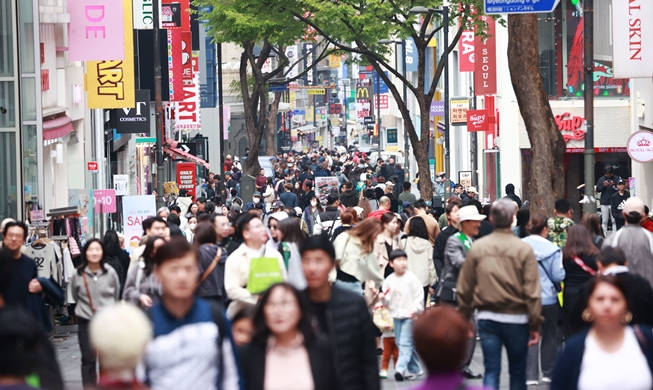-
 Korea.net's 24-hour YouTube channel
Korea.net's 24-hour YouTube channel- NEWS FOCUS
- ABOUT KOREA
- EVENTS
- RESOURCES
- GOVERNMENT
- ABOUT US
By Yoon Sojung and Yoon Seungjin
Photos = Jeon Han
Video = Jeon Han and Lee Jun Young
Danish Ambassador to Korea Svend Olling says, "If we put our spirit of innovation and boldness together, we can achieve a lot of things."
Both countries can find solutions to global issues given their like-mindedness and possession of the world's most advanced technological capabilities, says the diplomat.
In an interview with Korea.net on Jan. 29 to mark the 65th anniversary of bilateral ties this year, he said the Danish government hopes to bolster cooperation in climate and energy based on the Green Growth Alliance, medicine, and science.
In medical cooperation, the ambassador mentioned Denmark's dispatch of the hospital ship MS Jutlandia during the Korean War as the start of such collaboration between both countries, something that continues today based on cutting-edge technology.

Danish Ambassador to Korea Svend Olling on Jan. 29 in an interview at his official residence in Seoul's Seongbuk-gu District gives two thumbs up in emphasizing the spirit of innovation as the key to shaping bilateral cooperation.
The following are excerpts of the Jan. 29 interview at the ambassador's official residence in Seoul.
Your embassy's innovation center for bilateral cooperation in the field marked its 10th anniversary in December last year. What have both sides achieved in such collaboration and in what direction will it go?
We carefully selected seven places in the world including Seoul, Boston, Copenhagen (Denmark) and Munich (Germany) to build innovation centers where we can produce fruitful outcomes with our innovation ecosystem. Unlike the commerce department of a usual embassy that mainly deals with exports, imports and investment, this center forms an innovative ecosystem network over the long term with researchers and startups for the goal of technology cooperation and exchange with partner countries. It has worked and produced outcomes such as cooperation in quantum technology and smart hospitals.
Korea and Denmark are bold nations with something in common: innovation. Korea ranks very high on the international innovation index, and so does Denmark. Both are the world's two most innovative countries and two of the world's most technologically advanced countries. If we put our spirit of innovation and boldness together, we can achieve a lot of things.
In what sectors does the Danish government wish to boost bilateral cooperation?
Firstly, I would say the green sector because both countries joined the Green Growth Alliance in 2011. Thanks to the alliance, the two countries have worked closely together to actively respond to the climate change the world is facing. This is a very unique alliance and has spread to the areas of politics, science, business and energy and produced outcomes. I hope that this alliance can expand to science and technology sectors such as quantum technology and computing.
Pharmaceuticals and health are also promising areas and our biggest export sectors to Korea. We recently set up a Korea-Danish smart hospital alliance. Under the project, five selected hospitals each side plan to work together using technology robotics and artificial intelligence to tackle common tasks both societies face such as an aging population.
Food is another sector for bigger cooperation. Korean food such as kimchi and seaweed (gim) are now earning worldwide popularity. Even my daughter looked for Korean seaweed when she visited me in Korea, saying she wanted to make gimbap (seaweed rice roll) for herself. In Denmark, Korean food is considered a new alternative type of smart food that is less burdensome to climate.
Denmark has exported dairy products and meat like beef, pork and chicken to Korea. My personal ambition is to take it one step further and introduce more gourmet products to Korea. I think now is high time for it because demand for high-end food products is also increasing Korea.
Koreans and Danes conduct brisk exchanges and share strong interest in each other. How can this continue amid the vast distance between the two nations?
I think it has to do with a similar mindset. We are bold nations and want to change the world. We want a rule-based international order and for the United Nations to be a leading global factor so that we all live in peace and harmony. We want to act strongly together when we see challenges ranging from North Korea to Russia and the evil in Ukraine. We want to tackle problems together and find solutions with a common spirit, a fighting spirit.
The Ministry of Patriots and Veterans Affairs picked the Danish hospital ship MS Jutlandia as the Korean War hero for January. How have both countries preserved the vessel's legacy?
We are amazed and honored by all the attention Korean authorities have given us. After all, it was a hospital ship 73 years ago. At that time, we were horrified by the fact that the world had just exited World War II that devastated Europe, but didn't learn our lesson. So here we go again, another aggressive and imperialistic invasion.
Although we were such a small country far away from Korea and had no relationship with it, we felt the need to do something meaningful. So we decided to send a hospital ship. It may look small if compared with those of other countries that sent large numbers of soldiers like the U.S., U.K or Turkey. But making such a decision about a country we hardly knew was significant.
After the Armistice Agreement, medical staff on the ship felt that they hadn't finished their jobs. They loved Korea. They stayed on and worked with medical support teams from Sweden and Norway, which later contributed to the establishment of the National Medical Center. Today, Korea and Denmark have continued medical cooperation through today's smart hospital cooperation.
How does Copenhagen view Seoul's efforts to improve peace on the Korean Peninsula and denuclearize North Korea?
We are likeminded with the Republic of Korea. Both Korea and Denmark agree that we have to insist on a rules-based international order. We need to limit the number of warheads. Power, provocation and imperialism have no place. We also agree not just on North Korea but also with other troublesome states that we have to face through a two-track approach.
We have to be tough and robust in responding to provocations and dangerous warmongering. But we also have to keep a path open. There is a way back. If you want to step back from the brink of aggression, we are always ready to talk about how we can find solutions diplomatically and peacefully. This is the common denominator of how we approach this matter.
There is a special opportunity now because Korea became a non-permanent member of the United Nations Security Council on Jan. 1. Issues regarding Ukraine and North Korea are on the agenda. Denmark is a candidate (for the council) this year. I hope it will be elected to join from 2025, which means that Denmark and Korea will be on the Security Council. And we will be looking forward to working with Korea on tackling these global issues while we are both there.
You assumed your position in Seoul in May last year. What plans or goals do you have while serving here?
I would like to see the intensification of bilateral cooperation between Seoul and Copenhagen. Political leaders, businesspeople and the people of both countries all support that. If we work together, we can offer solutions to the challenges we have.

Danish Ambassador to Korea Svend Olling in an interview with Korea.net shows a photo of the Danish hospital ship MS Jutlandia sent during the Korean War at his official residence in Seoul.
arete@korea.kr
Most popular
- First hearing-impaired K-pop act hopes for 'barrier-free world'
- 'Mad Max' director impressed by 'cinema-literate' Korean viewers
- Romanian presidential couple visits national cemetery
- 'Korean mythology is just as wonderful as Greek and Roman'
- Hit drama 'Beef' wins awards from 3 major Hollywood guilds













